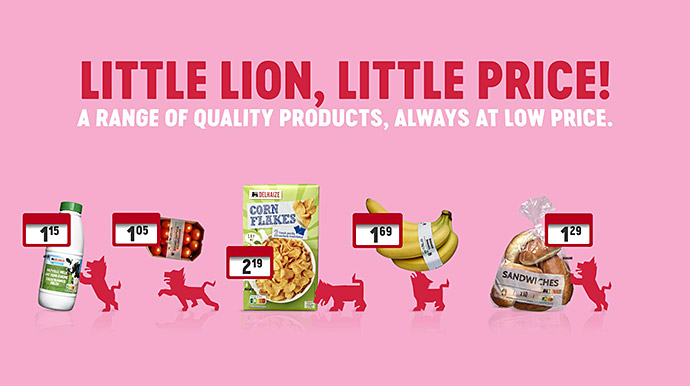|
 Après ses études de traductrice et interprète, ainsi qu'en communication & marketing à la Erasmushogeschool, Isabel a débuté sa carrière du côté des agences, en 2003. D'abord chez DDB, puis LG&F/Famous, Mortierbrigade, et enfin 8 ans chez TBWA. Elle a travaillé pour des clients tels que la Loterie Nationale, Bacardi, AXA, Deutsche Bank, avant de devenir Client Service Director pour Telenet. En 2019, elle passe 'de l'autre côté', chez Delhaize. Sous la vice-présidence d'Aude Mayence, elle est co-responsable de toutes les campagnes, des actions de fidélisation, du dépliant hebdomadaire, du matériel en point de vente pour les 800 magasins, et des actions locales. Tout cela a démarré sur les chapeaux de roues avec les Légumes Magiques, et depuis, elle œuvre afin que Delhaize devienne l'enseigne la plus saine du marché, avec de nombreuses campagnes et activations : payer moins pour manger mieux en septembre, le lancement de SuperPlus, de Belhaize, des P'tits Lions… Une affaire à suivre.
Après ses études de traductrice et interprète, ainsi qu'en communication & marketing à la Erasmushogeschool, Isabel a débuté sa carrière du côté des agences, en 2003. D'abord chez DDB, puis LG&F/Famous, Mortierbrigade, et enfin 8 ans chez TBWA. Elle a travaillé pour des clients tels que la Loterie Nationale, Bacardi, AXA, Deutsche Bank, avant de devenir Client Service Director pour Telenet. En 2019, elle passe 'de l'autre côté', chez Delhaize. Sous la vice-présidence d'Aude Mayence, elle est co-responsable de toutes les campagnes, des actions de fidélisation, du dépliant hebdomadaire, du matériel en point de vente pour les 800 magasins, et des actions locales. Tout cela a démarré sur les chapeaux de roues avec les Légumes Magiques, et depuis, elle œuvre afin que Delhaize devienne l'enseigne la plus saine du marché, avec de nombreuses campagnes et activations : payer moins pour manger mieux en septembre, le lancement de SuperPlus, de Belhaize, des P'tits Lions… Une affaire à suivre.
|
|
 Après avoir étudié philologie et littérature, Dorien a débuté sa carrière en 2014. En tant que stratège, elle a un amour pour la créativité autant dans sa vie professionnelle et personnelle. Sa curiosité pour la publicité l'a menée chez mortierbrigade, où elle a élaboré les stratégies pour des campagnes couronnées de succès comme celles de Mobile Vikings, ING, DreamLand, Canvas et De Morgen. En 2020, elle entame un nouveau chapitre chez TBWA où, en tant que directeur stratégique, elle est responsable pour entre autres Delhaize, ING, Van Marcke et Lindemans.
Après avoir étudié philologie et littérature, Dorien a débuté sa carrière en 2014. En tant que stratège, elle a un amour pour la créativité autant dans sa vie professionnelle et personnelle. Sa curiosité pour la publicité l'a menée chez mortierbrigade, où elle a élaboré les stratégies pour des campagnes couronnées de succès comme celles de Mobile Vikings, ING, DreamLand, Canvas et De Morgen. En 2020, elle entame un nouveau chapitre chez TBWA où, en tant que directeur stratégique, elle est responsable pour entre autres Delhaize, ING, Van Marcke et Lindemans.
|









 Après ses études de traductrice et interprète, ainsi qu'en communication & marketing à la Erasmushogeschool, Isabel a débuté sa carrière du côté des agences, en 2003. D'abord chez DDB, puis LG&F/Famous, Mortierbrigade, et enfin 8 ans chez TBWA. Elle a travaillé pour des clients tels que la Loterie Nationale, Bacardi, AXA, Deutsche Bank, avant de devenir Client Service Director pour Telenet. En 2019, elle passe 'de l'autre côté', chez Delhaize. Sous la vice-présidence d'Aude Mayence, elle est co-responsable de toutes les campagnes, des actions de fidélisation, du dépliant hebdomadaire, du matériel en point de vente pour les 800 magasins, et des actions locales. Tout cela a démarré sur les chapeaux de roues avec les
Après ses études de traductrice et interprète, ainsi qu'en communication & marketing à la Erasmushogeschool, Isabel a débuté sa carrière du côté des agences, en 2003. D'abord chez DDB, puis LG&F/Famous, Mortierbrigade, et enfin 8 ans chez TBWA. Elle a travaillé pour des clients tels que la Loterie Nationale, Bacardi, AXA, Deutsche Bank, avant de devenir Client Service Director pour Telenet. En 2019, elle passe 'de l'autre côté', chez Delhaize. Sous la vice-présidence d'Aude Mayence, elle est co-responsable de toutes les campagnes, des actions de fidélisation, du dépliant hebdomadaire, du matériel en point de vente pour les 800 magasins, et des actions locales. Tout cela a démarré sur les chapeaux de roues avec les  Après avoir étudié philologie et littérature, Dorien a débuté sa carrière en 2014. En tant que stratège, elle a un amour pour la créativité autant dans sa vie professionnelle et personnelle. Sa curiosité pour la publicité l'a menée chez mortierbrigade, où elle a élaboré les stratégies pour des campagnes couronnées de succès comme celles de Mobile Vikings, ING, DreamLand, Canvas et De Morgen. En 2020, elle entame un nouveau chapitre chez TBWA où, en tant que directeur stratégique, elle est responsable pour entre autres Delhaize, ING, Van Marcke et Lindemans.
Après avoir étudié philologie et littérature, Dorien a débuté sa carrière en 2014. En tant que stratège, elle a un amour pour la créativité autant dans sa vie professionnelle et personnelle. Sa curiosité pour la publicité l'a menée chez mortierbrigade, où elle a élaboré les stratégies pour des campagnes couronnées de succès comme celles de Mobile Vikings, ING, DreamLand, Canvas et De Morgen. En 2020, elle entame un nouveau chapitre chez TBWA où, en tant que directeur stratégique, elle est responsable pour entre autres Delhaize, ING, Van Marcke et Lindemans.